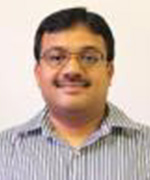| 01 |
 Prof. V. K. Dubey (Health and Family Welfare)
School of Biochemical Engineering IIT(BHU), Varanasi |
vkdubey.bce@iitbhu.ac.in |
A healthy and productive brain and mind system of an individual is a sine qua non for full economic development and contribution of the persona in the advancing society today. An efficient physiological and cognitive readiness of an individual has great contribution, not only to his health and welfare, but also to his education, employability and realization. The area of focus formulated here is Brain/Mind Healthcare, as W.H.O. study emphasizes that disease load due to Brain/Mind illness has the maximal economic burden to the society, even exceeding the combined burden of Cancer and Heart disease put together. Accordingly, IIT (BHU) has proposed the program om National Mission on DAPT on Brain/Mind Health (NM-DAPT- BMH). The two major aspects of healthcare are (i) Screening or Diagnosis, (ii) Therapy or Treatment, while other collateral aspects are modalities that enable the following attainments:
(iii) Disease Prevention, (iv) Rehabilitation, and (v) Health Promotion. IIT (BHU) has well acknowledged expertise in the Health-related sector, having departments/schools/centres on Bio Medical engineering, Pharmaceutics, Biochemical engineering, as well as Centre on Tissue engineering & Biomaterials. Further, the IIT (BHU) has close collaboration with in-campus premier clinical institutions, such as Tata Memorial Centre – Varanasi (DAE, GOI), and IMS (BHU), the Institute of Medical Sciences, recently upgraded to AIIMS level institution, which has a nationally renowned Neuro Centre and departments on Psychiatry and Mental Health.
Diagnostic and Screening Systems: There is a crucial Indian need for formulation of non- invasive disease identification technology. Today, using principles of “Data Analytics”, the universally available high data throughput scanning, signalling or imaging systems furnishes a high-precision mapping of the structural and functional activity of organs or tissues. Naturally, for the health technology industry, a greatly unfilled gap for the country is to develop digital diagnostic/screening systems validated for tropical neurological/mental health disorders, tested in Indian populace with local doctors in both public sector and private sector health/medical units. In numerous diagnostic cases, it is found that that A.I. and Pattern Recognition methods often outperforms the clinical diagnostic efficiency of an overworked busy doctor, whether in the U.S or in India.
Treatment Planning & Therapeutic Systems: Coming to the health management scenario, the advent of Medical Expert Systems and the International Collaborative Epidemiology Programs have demonstrated the very reliable validated ability of “Predictive Technologies”. Thereby, one can enable: (i) the automated forecasting of the most efficient therapy protocol, and (ii) judicious selection and optimization of the most feasible therapeutic agents, whether drugs, physiotherapy, cognitive stimulation, electrical pace-making etc. Such platforms are formulated by devising informatics-based Therapeutic Decision-making Systems, along with Treatment Planning Systems, using Machine Learning and Pattern Recognition principles. Needless to say, these approaches use computational Operations Research techniques to maximize the clinical performance of the therapy, as well as minimize the side-effects, and keep the cost within insurance payment or affordability bounds.